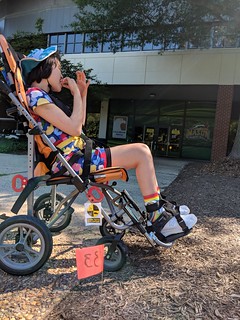Rett syndrome
(Redirected from Rett Syndrome)
| Rett syndrome | |
|---|---|

| |
| Synonyms | Cerebroatrophic hyperammonemia |
| Pronounce | N/A |
| Field | Psychiatry, pediatrics |
| Symptoms | Problems with language, coordination, and repetitive movements, slower growth, smaller head |
| Complications | Seizures, scoliosis, sleeping problems |
| Onset | After 6 to 18 months of age |
| Duration | Lifelong |
| Types | |
| Causes | Mutation of the MECP2 gene |
| Risks | |
| Diagnosis | Based on symptoms, genetic testing |
| Differential diagnosis | Angelman syndrome, autism, cerebral palsy, various neurodegenerative disorders |
| Prevention | |
| Treatment | Special education, physiotherapy, braces |
| Medication | Anticonvulsants |
| Prognosis | Life expectancy for many is middle age |
| Frequency | 1 in 8,500 females |
| Deaths | |
Rett Syndrome (RTT) is a genetic neurological disorder primarily affecting females, characterized by a progression of multiple impairments affecting language, motor skills, and growth. It typically manifests between 6 to 18 months of age. While symptoms and their severity can vary, common issues include language and coordination difficulties, repetitive movements, growth retardation, problems with walking, and a reduced head size. Seizures, scoliosis, and sleep disturbances are notable complications. Despite these challenges, individuals with Rett Syndrome can often live into middle age.
Etiology[edit | edit source]
Rett Syndrome is caused by a genetic mutation, specifically in the MECP2 gene on the X chromosome. The mutation is typically de novo, arising spontaneously rather than being inherited from parents, accounting for less than one percent of cases. As the mutation occurs on the X chromosome, the condition almost exclusively affects girls; boys with a similar mutation generally do not survive beyond infancy.[1]
Diagnosis[edit | edit source]
Diagnosis of Rett Syndrome is symptom-based and can be confirmed with genetic testing to detect the MECP2 mutation. The diagnostic criteria encompass postnatal deceleration of head growth, loss of acquired purposeful hand skills followed by repetitive movements, social engagement impairments, poorly coordinated gait, and severe language development deficits.[2]
Treatment and Management[edit | edit source]
While there is currently no cure for Rett Syndrome, symptom management is crucial to enhance the quality of life. Therapies include special education programs, physiotherapy, occupational therapy, speech therapy, and use of orthotic devices. Anticonvulsant medications can help manage seizures. Nutritional support is often necessary due to chewing and swallowing difficulties.[3]
Epidemiology[edit | edit source]
Rett Syndrome is a rare disorder, affecting approximately 1 in 8,500 females.[4]
History[edit | edit source]
Rett Syndrome was first described in 1966 by Andreas Rett, a Viennese pediatrician. His findings, initially published in German, did not receive global attention until 1983, when Swedish pediatrician Bengt Hagberg published an article in English and named the syndrome after Rett. The causative mutation in the MECP2 gene was discovered in 1999 by Lebanese-American physician Huda Zoghbi.[5]
Research Directions[edit | edit source]
While the current management of Rett Syndrome focuses on symptomatic treatment, recent advances in understanding the molecular pathogenesis have opened up possibilities for targeted therapeutics. Preclinical studies have indicated that the neurological dysfunction in Rett Syndrome might be reversible, paving the way for new strategies that could restore normal neuronal function.[6]
See Also[edit | edit source]
- Genetic disorder
- MECP2
- X chromosome
- Neurological disorders
- Seizures
- Scoliosis
- Sleep disorders
- Special education
- Physiotherapy
| This article is a medical stub. You can help WikiMD by expanding it! | |
|---|---|
| Autism | ||||||||||||||||||||
|---|---|---|---|---|---|---|---|---|---|---|---|---|---|---|---|---|---|---|---|---|
|
| Diseases of the nervous system, primarily CNS (G04–G47, 323–349) | ||||||||||||||||||||
|---|---|---|---|---|---|---|---|---|---|---|---|---|---|---|---|---|---|---|---|---|
|
| X-linked disorders |
|---|
|
|
- ↑ , Rett Syndrome: A Genetic Update and Clinical Review Focusing on Comorbidities, ACS Chemical Neuroscience, DOI: 10.1021/acschemneuro.7b00346, Accessed on: 2023-05-18.
- ↑ , Rett Syndrome: Revised Diagnostic Criteria and Nomenclature, Annals of Neurology, DOI: 10.1002/ana.22124, Accessed on: 2023-05-18.
- ↑ , Rett Syndrome: Therapeutic Strategies and Future Perspectives, The Journal of Neuroscience Research, DOI: 10.1002/jnr.24446, Accessed on: 2023-05-18.
- ↑ , Rett Syndrome: A Pervasive Neurodevelopmental Disorder with Socioeconomic Impact, Public Health Genomics, DOI: 10.1159/000329420, Accessed on: 2023-05-18.
- ↑ , The Story of Rett Syndrome: From Clinic to Neurobiology, Neuron, DOI: 10.1016/j.neuron.2008.10.015, Accessed on: 2023-05-18.
- ↑ , Rett Syndrome and the Ongoing Therapeutic Renaissance, Current Opinion in Psychiatry, DOI: 10.1097/YCO.0000000000000561, Accessed on: 2023-05-18.
Search WikiMD
Ad.Tired of being Overweight? Try W8MD's physician weight loss program.
Semaglutide (Ozempic / Wegovy and Tirzepatide (Mounjaro / Zepbound) available.
Advertise on WikiMD
|
WikiMD's Wellness Encyclopedia |
| Let Food Be Thy Medicine Medicine Thy Food - Hippocrates |
Translate this page: - East Asian
中文,
日本,
한국어,
South Asian
हिन्दी,
தமிழ்,
తెలుగు,
Urdu,
ಕನ್ನಡ,
Southeast Asian
Indonesian,
Vietnamese,
Thai,
မြန်မာဘာသာ,
বাংলা
European
español,
Deutsch,
français,
Greek,
português do Brasil,
polski,
română,
русский,
Nederlands,
norsk,
svenska,
suomi,
Italian
Middle Eastern & African
عربى,
Turkish,
Persian,
Hebrew,
Afrikaans,
isiZulu,
Kiswahili,
Other
Bulgarian,
Hungarian,
Czech,
Swedish,
മലയാളം,
मराठी,
ਪੰਜਾਬੀ,
ગુજરાતી,
Portuguese,
Ukrainian
Medical Disclaimer: WikiMD is not a substitute for professional medical advice. The information on WikiMD is provided as an information resource only, may be incorrect, outdated or misleading, and is not to be used or relied on for any diagnostic or treatment purposes. Please consult your health care provider before making any healthcare decisions or for guidance about a specific medical condition. WikiMD expressly disclaims responsibility, and shall have no liability, for any damages, loss, injury, or liability whatsoever suffered as a result of your reliance on the information contained in this site. By visiting this site you agree to the foregoing terms and conditions, which may from time to time be changed or supplemented by WikiMD. If you do not agree to the foregoing terms and conditions, you should not enter or use this site. See full disclaimer.
Credits:Most images are courtesy of Wikimedia commons, and templates, categories Wikipedia, licensed under CC BY SA or similar.
Contributors: Prab R. Tumpati, MD



